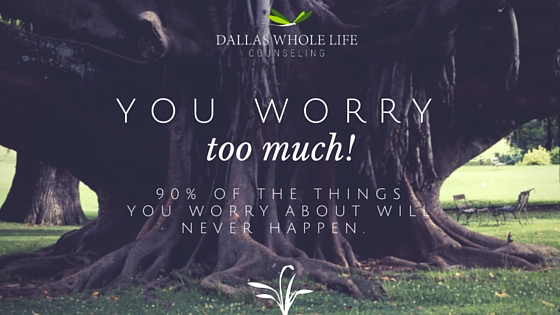You worry too much. 90% of the things you worry about will never happen. As for the other 10%, there was never any real chance of preventing these things anyway. Like they say in twelve step programs: If you worry yourself crazy about a feared outcome, then the feared outcome actually happens, you’ve experienced the dreaded event twice.
Worrying is not a virtue. It doesn’t make you safer, responsible or secure. Worrying is not the same thing as planning and problem solving. How do you know the difference? If you’re simply planning or solving a real problem, you generate concrete actions steps and you follow through with those steps. There is a beginning, middle and end to the situation you’re addressing, no matter how things turn out. But worrying is endless. Worrying generates more worrying. You start off worried about your health, then you’re worried about finances to pay your medical bill, then you’re wondering if you chose the right career path, then you’re remembering your senior year in high school when you had that fight with your father and . . . and . . . Worrying is mental junk food. The more you “eat” your worried thoughts, the more you want.
Gratitude is a great antidote to worry. Next time your mental wheels start spinning out of control, take a few minutes for yourself. Give yourself five minutes, then return to worrying if you have to. But during that five minutes, think about all the incredible things in your life. Need some help?
Feel free to be thankful for any of the following:
- TV is better than it’s ever been.
- You are alive.
- Justin Bieber is Canadian, so he’ll never be the U.S. President.
- You can count on your next meal.
- You know more now than you did five years ago.
- Weather. Any kind will do.
- You got away with that thing you did, even though you were bending the rules a bit.
- Your third grade teacher showed you some small act of kindness that still makes you smiles all these years later.
- You have enough money to even think about savings, investments, retirement or property tax.
- You have so little money, you don’t have the headache of savings, investments, retirement or property tax.
About the Author: James Robbins is a licensed professional counselor, published author and co-owner of Dallas Whole Life Counseling. He has over 15 years of experience helping people in various life stages that come from a wide variety of cultural, economic and family backgrounds. Learn more about his background by clicking here.



Leave a Reply
You must be logged in to post a comment.